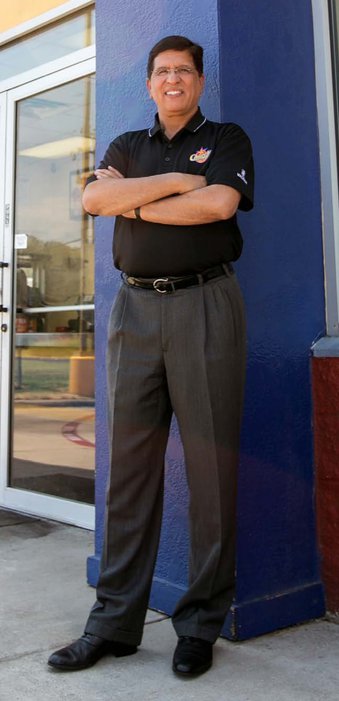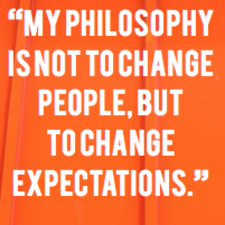By Gina Tagliarino
We’ve all heard the saying that you must walkbra mile in someone else’s shoes before youbrcan really understand who they are andbrwhat they do. But when you’re speaking tobrAslam Khan, a highly successful entrepreneur and one of thebrtop franchise holders in the country, it really isn’t that simple.br
Although today the 60-year-old owner of Falcon Holdings,brLLC is known for being the king of the turnaround story forbrstruggling franchises including Church’s Chicken, PiccadillybrCafeteria, Long John Silver’s, A&W and Hardee’s, it hasn’tbralways been that way. Now living in a sprawling 16,500-square-brfoot home set on three acres on the west side of Southlake,brKhan recalls a much different time – one growing up in thebrsmall village of Fatehabad, Pakistan, where shoes and mostbrhuman necessities were merely a fantasy.br
Humble Beginnings “Poverty in the United States isbrdifferent than poverty in third-world countries,” Khanbrexplains about the conditions he faced as a child. “There,brwhen you say ‘poor,’ you mean no running water, no clothes,brnothing at all.”br
With no schools to attend in his village of about 500brpeople, Khan walked up to six miles each day on the moun-brtain to attend school in the nearest town. By age 12, he notbronly walked, but also swam his way to education, crossing abrthree-mile river without a bridge.br
“You’d take your clothes off, hold them up, and in thebrother hand you’d hold your bag,” Khan explains matter-of-brfactly. “Then you’d put your clothes back on when you got tobrthe other side and go to school.”

The son of poverty-ridden farmers and one of 10 children,brKhan knew that any sort of future he hoped to create forbrhimself was in his hands. Though schooling was not requiredbrfor children in his village, he quickly realized it was thebronly opportunity he had to spend his life living rather thanbrsimply surviving.br
“When I came to my senses as a kid, I was thinking,br‘This is not a lifestyle. I’m sure there is better than thisbrsomewhere,’” Khan recalls. “As I got into middle school, I started reading more, and I realized education was thebronly way I was going to get out of this mess. So I startedbrplanning and planning, and finally I broke off and left.”
br br brThe Pursuit of a Better Life At this time, when Khanbrdecided to leave his family to pursue a better life, he was onlybr14, but had already experienced more hardships than anybrchild ever should. He decided now was the time to reach forbrmore, and he never looked back.br
“I went to the nearest city, which was then a two- to three-brhour walk and a three-hour bus ride, so six hours away total,”brKhan says. There he completed high school and college, andbrlanded his “first real job” at the U.S. Embassy in Pakistan’sbrcapital city of Islamabad after seeing an advertisement for thebrjob. During his seven and a half years there, Khan receivedbrhis first introduction to American culture and the restaurant business, which would become his life’s work. But first,brhe had to prove himself, both in Pakistan and in the UnitedbrStates.br
“I was a bartender, then I became head of dining andbrwas the general manager at the U.S. Embassy when I left forbrAmerica,” Khan recalls.br
His hard work had paid off in Pakistan, but when hebrsettled in Southern California 30 years ago, he quickly learnedbrthat without local references, he might as well be startingbrfrom scratch.br
“I didn’t have time to waste because I didn’t have a lotbrof money,” Khan says. So, he picked up the first job he wasbroffered as a dishwasher at a local Church’s Chickenbrfranchise, but it wasn’t long before co-workers beganbrnoticing his full potential. “As people got to know me, theybrput me in a Manager-in-Training program, and I became abrgeneral manager again,” he explains.br
Never one to get discouraged, Khan said the key to hisbreventual success was to keep moving forward. “Every day,brI would just pick up my stuff and keep on going,” he says.br
Finding His Stride It only took a few years for Khan tobrhave the chance to prove himself in America when he was given the opportunity to help a failingbrChurch’s Chicken franchise get back on itsbrfeet. He did that, and then some, helpingbrthem to not only stabilize, but also to profit.brSoon he became the go-to guy for franchisesbron the rocks, turning around businesses facing financial trouble, as he put to use thebrskills he gained through the years he spentbras both a persistent student and a determined employee. By 1999, he had taken onbrthe role as primary owner of Falcon Holdings, LLC, purchasing 100 Church’s Chickenbrunits along the way.
br br brNow, more than 15 years later, Khan continues to do what he does best, currentlybrowning approximately 300 franchises for abrvariety of restaurant brands, which he willbrhelp rebuild while simultaneously sellingbrand purchasing others. He permanentlybrmoved his headquarters to Southlake inbr2008 after an extensive three-year search forbrthe ideal location for his wife of 22 years,brHilda, and their son, Abraham, an incomingbrfreshman at The University of Texas at Dallas this fall.br
So why did Southlake reign as the winner? “It’s the best place to live – close to thebrairport, the weather is good, and the peoplebrare really friendly,” Khan says.br
Not that he has had much free time tobrsoak in all that Southlake has to offer. Neverbrone to shy away from a challenge, Khan hasbrmade it his mission to not only purchasebrfailing franchises, but to connect with hisbremployees on a personal level. It’s the valuebrhe sees in these employees that really makesbrhim stand out, and one of the reasons he wasbrawarded both the prestigious Entrepreneurbrof the Year from the International FranchisebrAssociation and the American Dream Awardbrfrom Multi-Unit Franchisee Magazine this year.
br br br
Success Shared “My philosophy is not tobrchange people, but to change expectations,”brKhan says. “You need to help them, you needbrto make sure that people are number one.”br
Khan is fond of using the phrase, “I’m notbrin the chicken business. I’m in the peoplebrbusiness.”

And it’s easy to see why. Countlessbrstories could be told of his turnaround business triumphs, but where he really shines isbrin helping his more than 13,000 employeesbrexcel.br
“I love helping people,” Khan says. Putting his money where his mouth is, so-to-brspeak, Khan has awarded 25 percent of thebrprofits from about 15 of his franchises tobrtheir senior managers, celebrating the hardbrwork and loyalty they have put into his company. And you won’t find Khan taking the afternoon off for a round of golf;brinstead he’s at his desk from morning until night, and he visits various franchisesbron the weekends.
br br brHis advice to aspiring entrepreneurs? Keep pushing. “If you really, really, reallybrwant to do something, focus,” Khan says. “Everybody has a dream, a goal, an expectation, but to take it to the other side and call it success you have to have extremebrdiscipline.”br
You also can’t forget where you started. “Since I came from extreme poverty, I hadbra mission that nobody in my future generations should be poor,” Khan says. “So I’mbrmoving with that mission.” To fulfill that promise, Khan is completely funding thebreducational needs of all his siblings’ children, ensuring his nieces and nephews willbrnever have to face the extraordinary hurdles he once faced.br
“I think if it had ever registered in my head that I had ‘made it,’ I would havebrstopped working like I am now,” Khan says. “But I keep poverty right in front of mebrall the time. It keeps me going forward through all the hoops, all the time.”br
Maybe one day Aslam Kham will retire to his Southlake home to spend quietbrafternoons working in his garden — a favorite hobby of his during his rare free time.brBut don’t count on it, at least not yet.
